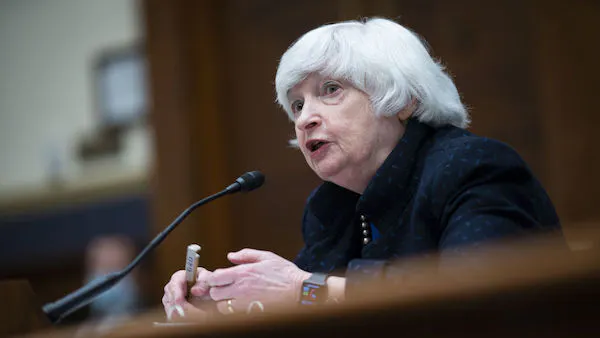Treasury Secretary Janet Yellen contended on Tuesday that climate change may lead to “declines in asset values” and warned that a “delayed and disorderly transition” to renewable energy sources could harm the financial system.
Yellen delivered the comments at the first meeting of the Climate-Related Financial Risk Advisory Committee, a body created to “understand and mitigate the risks that climate change poses” to economic stability. The economist’s remarks correspond to assertions from other Biden administration officials who have claimed that carbon emissions may impact the economy.
“As climate change intensifies, natural disasters and warming temperatures can lead to declines in asset values that could cascade through the financial system,” Yellen said in prepared remarks obtained by The Daily Wire. “And a delayed and disorderly transition to a net-zero economy can lead to shocks to the financial system as well. These impacts are not hypothetical. They are already playing out.”
Yellen cited storms and wildfires in California, Florida, and Louisiana as evidence that climate change is posing economic harm, even as scientists reject the notion that there is a proven link between individual weather phenomena and a warming climate. “Taking climate change into account is prudent risk management,” Yellen nevertheless continued. “Our work builds on the scientific consensus regarding the projected effects of climate change and is based on a widely accepted understanding of how the financial system works.”
Members of the Climate-Related Financial Risk Advisory Committee include Catherine Ansell, the executive director of climate risk at investment bank JPMorgan Chase, as well as Cecilia Martinez, the principal advisor for resilience and communities at the Bezos Earth Fund. Several academics also sit on the body, which was established by the Financial Risk Advisory Committee last year, according to a press release from the Treasury Department.
“Some of you have very specialized expertise in modeling climate risks and working with climate data,” Yellen said. “Others have experience helping financial institutions respond to and manage their own climate risks. And others have experience advancing environmental justice. I’m excited for this group to begin meeting, and for us to benefit from your expertise.”
The first meeting of the Climate-Related Financial Risk Advisory Committee occurs after the Labor Department introduced a final rule that would allow retirement fiduciaries to weigh “the economic effects of climate change and other ESG considerations” as long as such concerns are relevant to a risk-and-return analysis. The new rule, which reverses a prohibition formerly created under former President Donald Trump, would “safeguard the financial security of America’s families, businesses and workers from climate-related financial risk that may threaten the life savings and pensions of America’s workers and families.”
CLICK HERE TO GET THE DAILY WIRE APP
Republican members of the House and Senate, as well as a handful of Democrats, overturned the final rule last week. President Joe Biden is expected to veto the lawmakers’ resolution.
Critics of the environmental, social, and corporate governance movement, often abbreviated as ESG, assert that the investment philosophy mingles political and social causes, such as reducing carbon emissions and achieving racial diversity, in a manner that compromises or distracts from profitability. The previous rule established by the Trump administration barred retirement fund managers from “selecting investments based on non-pecuniary considerations” and required them to “base investment decisions on financial factors” alone.

.png)
.png)

